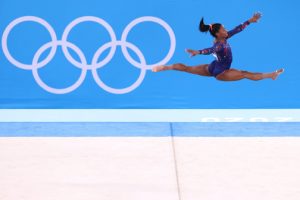
By Justin HAGER
The Tokyo Olympics came to a sparkling and hopeful finish on Sunday after more than two weeks of competition in 33 sports and 46 disciplines. After being pushed back a year, this year’s Olympiad offered both the uncomfortable reality of the ongoing pandemic, as captured by the empty stands in the still shiny new stadiums, and the hopeful optimism of athletes and organizers who pressed on despite the unprecedented public health and logistics challenges.
The 657 athletes on Team USA’s roster can hold their heads high as they once again laid claim to 113 total medals, 25 more than rival China, which sent their largest delegation ever with 431 athletes. In the gold medal race, the U.S. just barely squeaked out a win, scoring one more gold than China, 39-38. Host country Japan and its 615 athletes also had reason to celebrate when it finished in the top five in the total medal count and finally defeated the U.S. in baseball to capture the country’s first gold medal in the sport.
Of course, individual moments and stories of heartache and triumph dominate every Olympiad, and this year’s games were no different. This year’s competition was particularly notable for the many voices of women demanding dignity, equality and equity, including German gymnasts, inspired by Norwegian handball players, who scrapped their over sexualized outfits for more comfortable and modest performance athletic gear. Other examples included Megan Rapinoe and the bronze medal winning U.S. women’s soccer team, who took a knee for #BlackLivesMatter before the kickoff of their Group G match. They were joined by several other women’s soccer teams and by Costa Rican gymnast Luciana Alvarado, who concluded her floor routine with a first-of-its-kind in competition demonstration of support for Black Lives Matter.
Other women who stood for equality included a Belarusian sprinter who spoke out against the fear and violence that defined the authoritarian rule in her home country and then escaped her handlers to find sanctuary in Poland. And Japanese tennis star Naomi Osaka continued to speak out about mental health within youth and young adult sports. She found an unexpected ally in U.S. gymnast Simone Biles, the most decorated gymnast of all time, who put her health above societal expectations and withdrew from several events she was favored to win while still managing to take home two medals. Still other female athletes engaged in advocacy by simply refusing to deny their identities and relationships off the court, such as the trio of openly lesbian women who led the U.S. women’s basketball team to gold, Brittney Grimes, Diana Taurasi and Sue Bird.
Highlighting a different type of progress against discrimination, athletes and fans of skateboarding finally saw their sport gain legitimacy on the international stage as Tokyo became the first Olympiad to have skateboarding as an event.
Of course, the end of the Olympic games does not mean the end of international competition or the stories of inspiring athletes fighting for dignity, equality, equity and recognition. Just two weeks from now Tokyo will host the Paralympics, where the USA is also heavily favored to win in the overall medal count.

The opening ceremony for the Paralympics will take place on Aug. 24 with competition continuing through Sept. 5. During those two weeks, athletes will compete in 22 sports, with badminton and taekwondo making their Paralympic debut.
Like the Olympics, NBC will air the Paralympics on both its network and streaming services. The network anticipates providing approximately 1,200 hours of coverage, which would represent an all-time record for Paralympic coverage and a step forward in recognizing the incredible abilities of challenged and non-traditional athletes.
